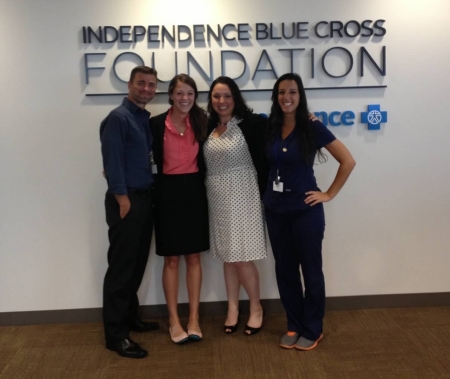Policy and patients: the experience of an IBC intern

Katie Magargee, 2nd from left, is pictured with her IBC preceptors at the IBC Nurse Intern Recognition Ceremony, Sumemr 2013.
Serving 2.1 million in the Philadelphia region alone, Independence Blue Cross (IBC) has made efforts to enhance the health and wellness of the communities they serve. IBC also recognizes the importance of providing these communities with well-trained professionals, offering students a glimpse to a different side of healthcare they might not see during their education. IBC launched their nurse internship program in 2005, assigning students to community health centers to gain practical clinical experience at an area nonprofit, privately-funded community health center.
In summer 2013, Villanova’s then-rising senior Katie Magargee from Bryn Mawr, Pa. was looking for a community-based internship and came across this opportunity, noting, “I have always been a big believer that it is important to give back to the community.”
As a student at Villanova, Katie has participated in three service trips over her spring breaks, expressing that “being immersed in the community while serving others is something I love to do.”
Katie’s time as a nurse intern was spent at Fairmount Primary Care Center (FPCC), a non-profit organization which provides medical care, dental care, and social work services to underserved patients including uninsured and homeless individuals. She says, “I knew this internship would provide the opportunity for me to do so and combine my nursing skills with my desire to serve others.”
As an IBC Nurse Intern at FPCC, Katie not only gained clinical experience with such tasks as triaging patients, administering immunizations, and performing EKGs but she also had the chance to be involved in a different capacity: policy making. In this rare opportunity, she collaborated with staff to create standing orders for Diabetic Hemoglobin A1C Testing (recommended every 3 months) as well as Asthmatic Spirometry Testing (recommended every 12 months). These standing orders allowed for team-based health care, lending to quicker and more efficient patient care.
The center is currently in the process of becoming a certified Patient Centered Medical Home (PCMH) which aims to deliver team-based health care, improved quality of care and improved access of care to patients. Overall, a certified PCMH health center reduces emergency room visits and hospitalizations. On a daily basis, FPCC was faxed emergency room discharge papers for patients and it was Katie’s responsibility to reach out to these patients, monitor their health status, reconcile their medications, and schedule follow –up appointments as part of transitional care management related to becoming a certified PCMH.
Along with several other health care centers across the nation, FPCC participated in a Diabetic Hemoglobin A1C Collaborative with the goal of the decreasing 20 diabetic patient’s hemoglobin A1Cs to below 9 by September 2013. Katie was immersed in this collaborative and helped to make a noticeable difference. In just a few weeks of reaching out to patients, providing the proper follow-up and diabetes education, she and the team had 9 patients who already reached their September goal; an impressive accomplishment.
“Coordinating care for patients was the most rewarding part of this experience”, she expressed and recalled a particular instance where she felt her work made a difference.
Katie explains, “I was involved in coordinating at home health care and physical therapy for an elderly man who developed a diabetic foot ulcer due to immobility and insufficient self-care. After going back and forth on the phone with the patient’s insurance company, the home health care company and the patient’s niece for a few hours, I finally was able to get a pre-authorization from the patient’s insurance company to cover the home health care company to visit the man once a week to help with ADLs and physical therapy starting the following week. Knowing that my efforts may have prevented future foot ulcers or hospitalizations for this man made me have so much pride in the nursing profession.”
This experience helped Katie apply the knowledge she learned in the classroom along with skills gained in labs and clinical rotations to this community health setting. Throughout the IBC Nurse Intern experience, she combined her knowledge of nutrition, pharmacology and chronic diseases to improve the quality of patient centered health care.
After completing the internship, she feels more confident going into the workforce next year. She plans to develop her nursing skills and have a greater impact on her community as she hopes to one day become a family nurse practitioner working in a primary care setting.
